"Do It Yourself" National Competition on Management of Menstrual Waste at Home
Oct 27, 2020
Story


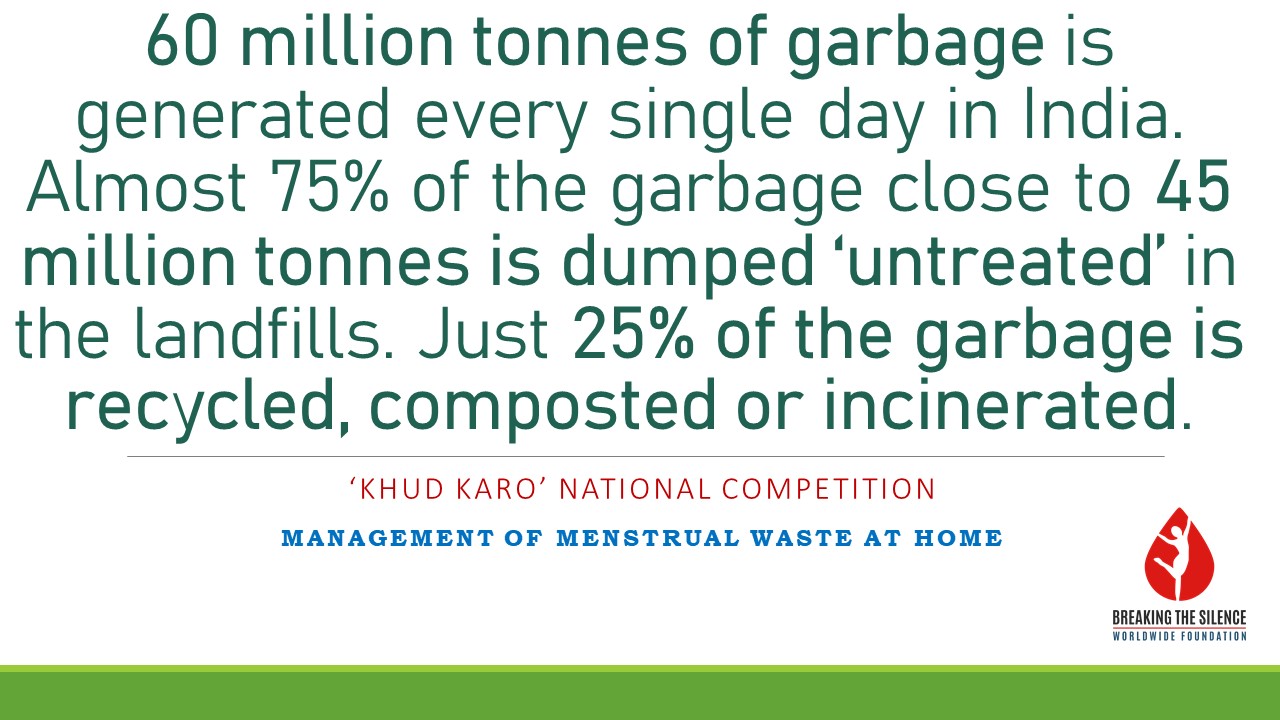
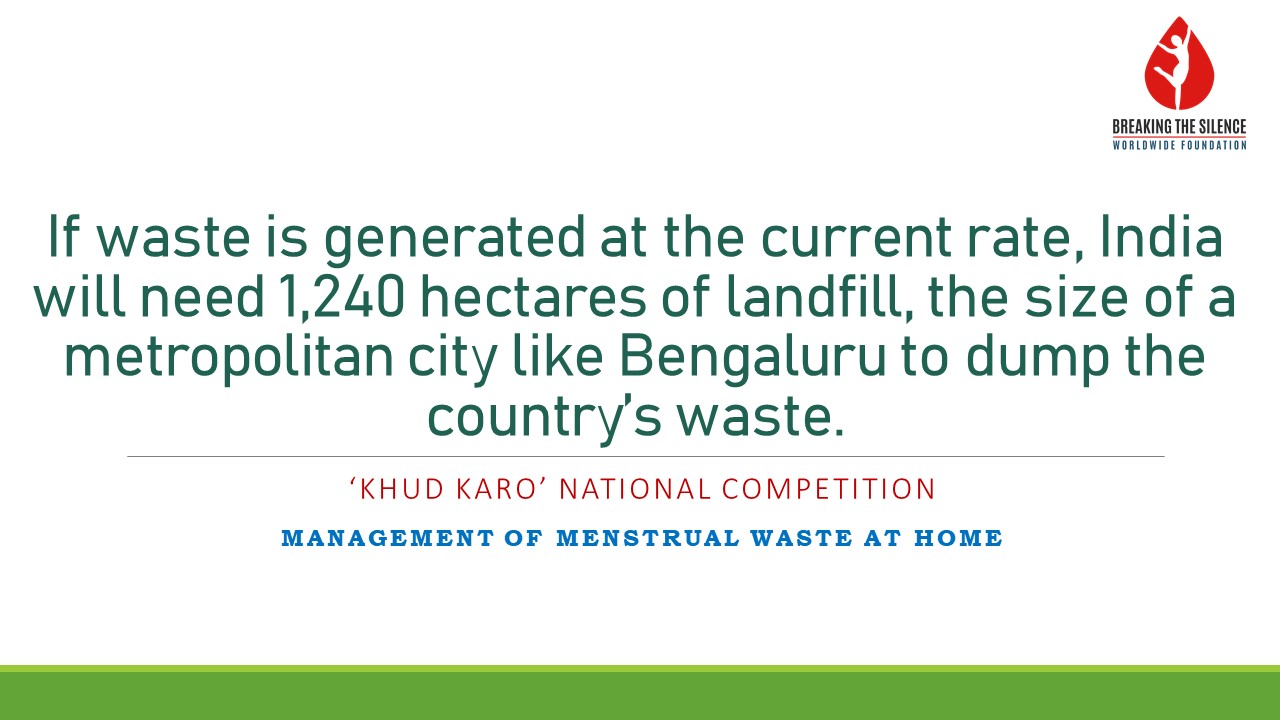
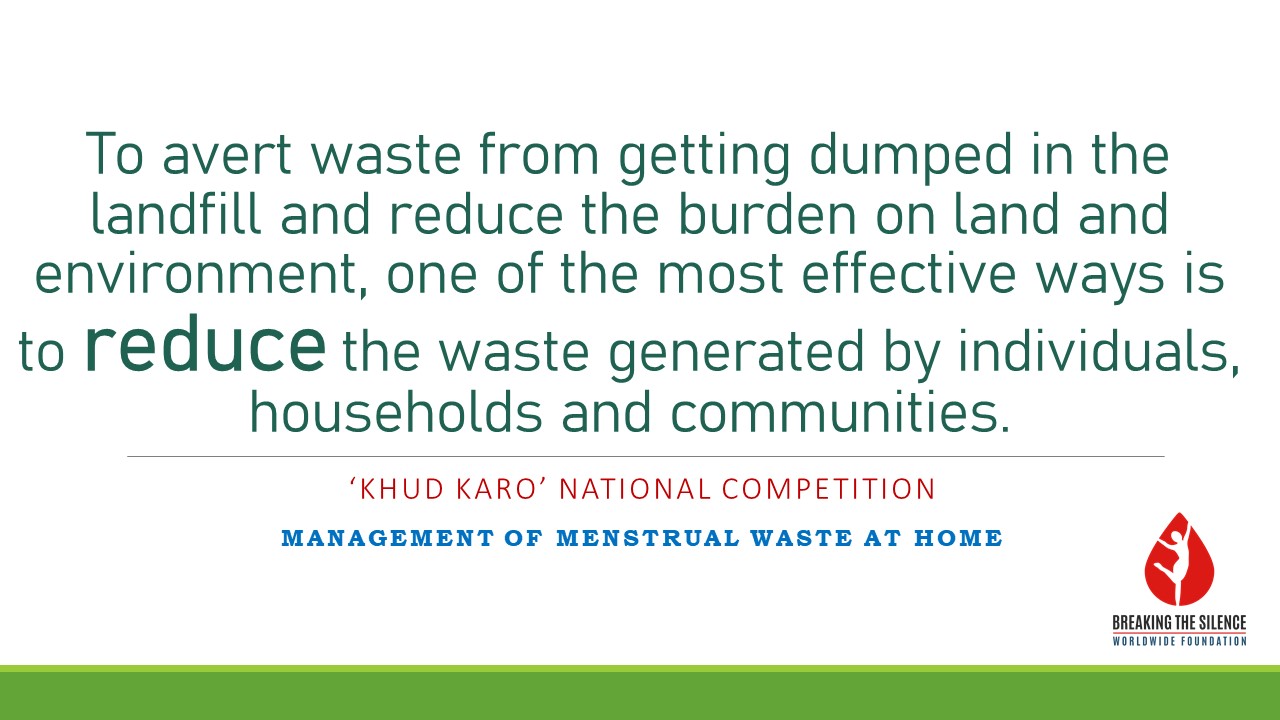
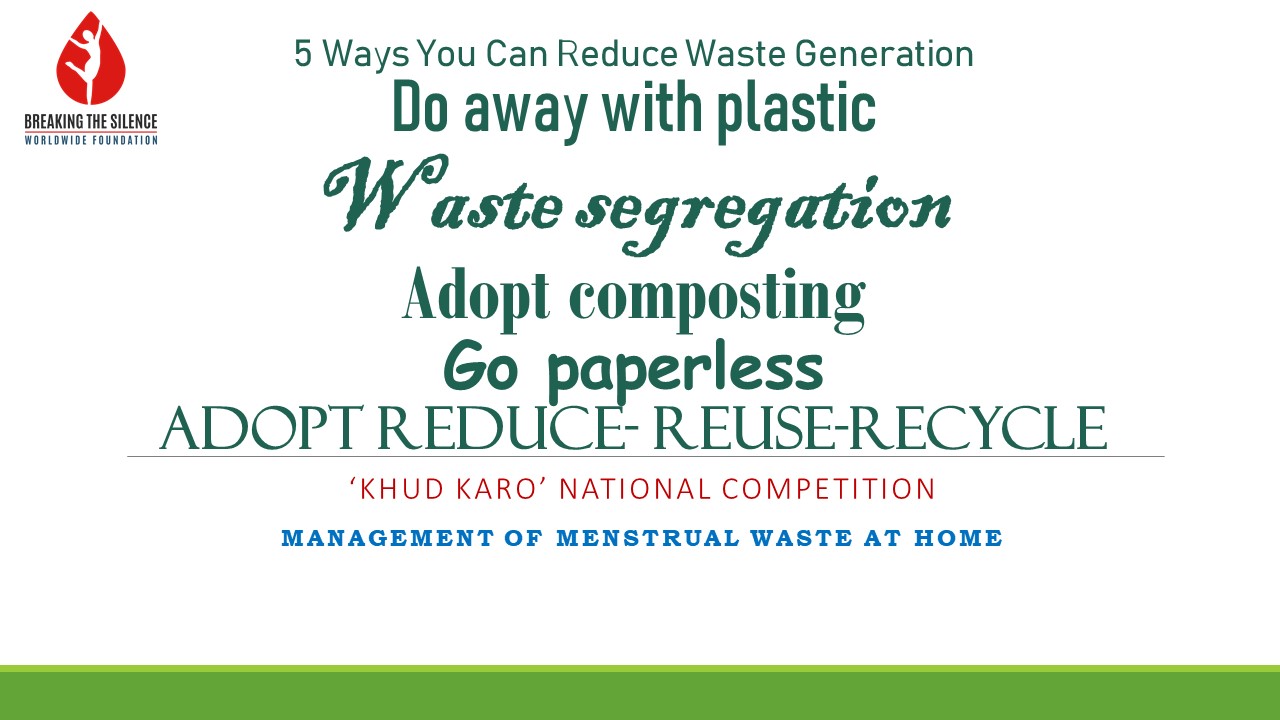
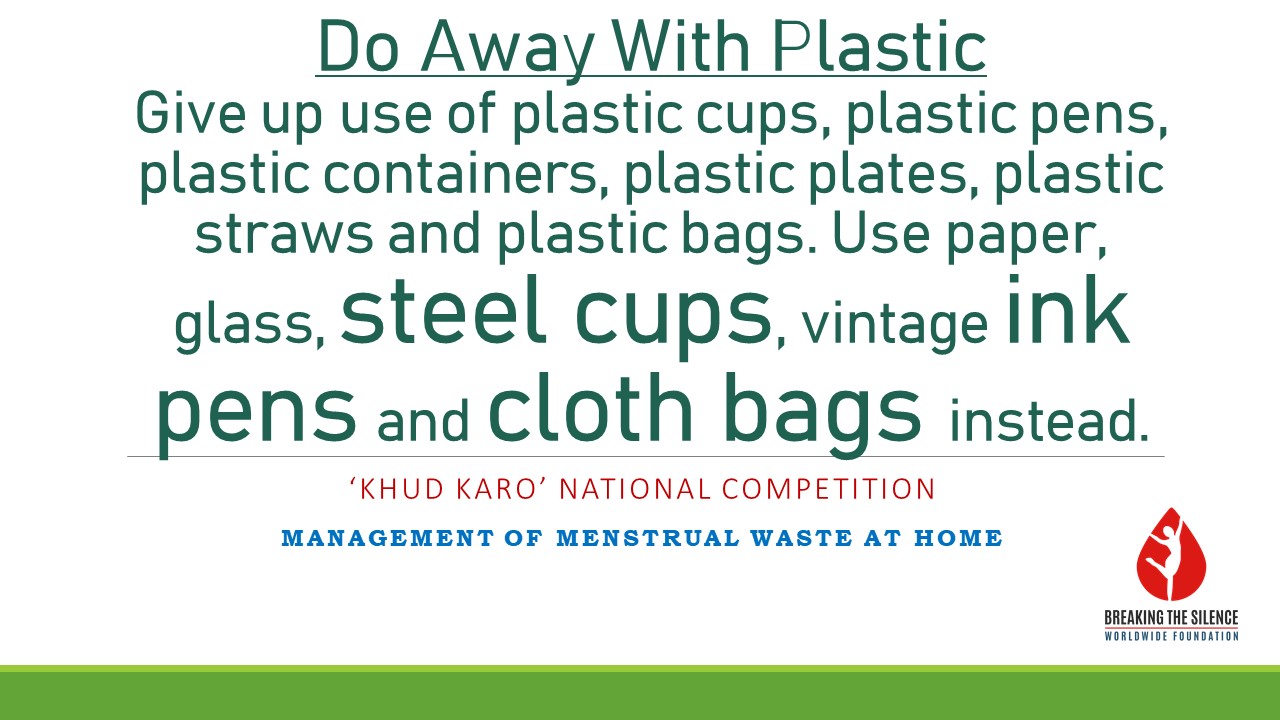

Welcome to the "Khud Karo" (English translation- Do it yourself) National Competition on Menstrual Waste Management at Home brought to you by Breaking the Silence Worldwide Foundation from 1 August to 2 October 2020 through social media/Facebook/Twitter/Instagram. On 2nd October winner's names will be announced and prizes and certificates awarded to them. All genders are invited to participate even though only girls and women generate menstrual waste because men and boys can educate family members.
The competition aims to mobilize people to manage soiled sanitary pads 'correctly and on their own' at home before it is disposed outside. Its goal is to build awareness on household waste and menstrual waste in terms of correct way to handle, store and dispose household waste BECAUSE EVERY LITTLE CHANGE BEGINS WITH INFORMATION. This competition is not just to spread awareness on the right method of sanitary waste disposal but also to collect ground realities from different corners of India through the insight of participants and their video submissions.
Please watch our video, participate by sending us your video of segregating menstrual waste via e-mail to urmilabtswf@gmail.com and both men and women, girls and boys are encouraged to participate.
In India, homes are super clean. Everyday there is sweeping and mopping and I know few homes where mopping is done even more than once to keep it squeaky clean. Shoes are often kept outside the main door to ensure cleanliness. But the same homes do not take that interest in ensuring the waste generated in their homes are stored in a clean manner, are separated according to the different types of waste/segregated, carried out to dispose the waste to the disposal mechanism available in the village, town or city.
In Bangalore where I live, BBMP or Bruhat Bengaluru Mahanagara Palike, the municipal corporation arranges waste pick up door-to-door from homes. Where big apartments are there, bins are installed in the basement where residents dispose the waste and the civic worker collects it on a daily basis. That way dwellers of Bengaluru are rather fortunate in contrast to my parents living in Imphal,Manipur who have not had any agency pick up waste from their homes in the past 2 years.
But even with such high end service available to us here, people do not make effort to segregate waste at home or throw their garbage correctly in the bins installed in their society building/apartments. Once I saw a lady whose balcony is adjacent to mine sweep her entire house and throw the dust and dirt collected by her outside from her balcony from the 4th floor! I took long to recover from that shock. Additionally, the site of the bins in the society are anything but pretty; cause being people do not care. Every time I go to place my house waste, I feel like puking on seeing, smelling or touching the bins and the mixed garbage because people do not care to segregate them. The landfill in New Delhi fooled me to believe it was a mountain range.
Waste management has always been a tough challenge even for the government and authorities and even though a lot has been achieved in terms of policy and new technologies being installed and used for collection, recycling and processing, there is one area that is seriously lagging behind. And that is people's involvement and commitment in waste management in their homes. The management of menstrual waste is even tougher for the municipality and civic workers.
We talk about hygiene during menstruation and our focus is mostly centered around sanitary products to use but the conversation is incomplete till we think and make arrangements about how we will throw them after use. Do users think, know and practice equal importance and responsibility towards disposal which has implications on other people like the waste pickers and civic workers and the environment?
Basic understanding on waste management scenario and the entire chain through which soiled sanitary pads go through till they reach their final destination can go a long way in changing the menstrual waste crisis in India. Menstrual hygiene and household waste management are correlated to each other. A house with no facility for collection and disposal of soiled sanitary pads will have no menstrual hygiene and good menstrual health among girls and women in the household. Do you know due to shame, secrecy and silence around menstruation, they go to great lengths to hide used and soiled pads? In the absence of proper disposal facility at home, school or office they are most likely to keep wearing a pad for long hours damaging their health and cleanliness.
No amount of investing money and human resource in waste management by the authorities, NGOs and partners can give us clean neighborhoods and safe environment till each unit, the household, takes responsibility and does their part with their garbage once equipped with accurate information and motivation to make a contribution.
Those with keen interest in the family, school or workplace in appropriate garbage handling and disposal and are personally involved with responsibility are people who have knowledge about what the waste crisis in India is.
Join Breaking the Silence Campaign and be the change you want to see in your neighbourhood, village, town or city. Join the competition that is making an effort to build awareness and social responsibility among each user of these sanitary materials to take ownership of managing menstrual waste.
Our 1st participant of the Khud Karo/Do It Yourself National Competition on Menstrual Waste Management is Nongmaithem Jerina from Manipur, a Master in Social Work (MSW) student from Rajagiri College of Social Sciences in Kerala.
It is fantastic how Jerina, 22, has taken such a profound step in segregating sanitary waste from other household waste and disposed it appropriately and then showing others how to do it, starting the ripple effect.
Jerina throws light on the local situation in terms of city waste management:
" We don't have a proper garbage bin to throw household waste in our localities in Manipur so we accumulate the waste in our house and waste collectors pick it up from our house once a week. During the lockdown this mechanism of waste collection has been disrupted; in fact nobody has come to collect our waste in these five months. Leaving no option, people throw the waste in the drains and in other cases, some have piled on the waste around their houses. In the absence of a city based disposal, I am clueless about where I should throw the soiled sanitary pads. This case is relevant in my locality and I cannot say with surety what is happening in other localities in Imphal."
The 2nd participant is Godwin Bosco from Kerala, 38, who works at Cognizant Technology Solutions, Kochi. Even though it is girls and women who generate soiled sanitary napkins, boys and men in the household have an important role in educating family members, their communities and friend circle on correct disposal of sanitary waste.
Godwin Bosco demonstrates how a guy can be in all conversations on menstrual hygiene management and safe disposal because it is not just a woman's issue, it is everyone's issue.
Godwin Bosco says, "Together, with small and planned steps we can make eath a better place."
Our third participant of the National Khud Karo Competition on Management of Sanitary Waste (English translation: Do it yourself) is Dipak Sinha, 52, central government officer who is currently posted in Bhopal/Madhya Pradesh but hails from Guwahati/Assam. Dipak believes and lives a life of conservation avoiding wastage of available resources at all levels. The video submission will show you clearly the planning and thought that has gone behind his conservation efforts within his home.
"Every person can contribute in his/her own way to make a difference to the waste crisis in particularly bio-medical waste that includes sanitary waste."
If you want to wish to share Dipak's video- https://www.youtube.com/watch?v=TF3ma-46-FQ
Our fourth participant Khumlo Gomti Khining an Anganwadi Worker from Japhou Bazar, Chandel District in Manipur (India) says
" The Autonomous District Council in Chandel are trying hard to sanitize the bazar area by picking up wastes from each pick up point but is facing some set back like the dustbin trucks are irregular, the dumping site is messy with unburnt waste lying around in the open. Street dogs and cattles are feeding on the waste and scattering it causing much mess all around. It is heart breaking to see the deterioration of ecology from lack of waste management. We live in a town but it is not urbanized so we have to make our own disposal system and site within our home compound."
Ps: Burning of sanitary waste is not recommended as a disposal solution till the time no other option is available to women. In case sanitary waste has to be burnt, the right method is to dig a pit not less than 1.0 meter deep and burn the used pads in the pit.
Please encourage Khumlo Gomti by liking and sharing her video: https://www.youtube.com/watch?v=-jHtcwnmCso
The National Competition on Managing Menstrual Waste at Home is reaching different corners of India! People from Kerala, Karnataka, Tamil Nadu, Maharashtra, Madhya Pradesh and West Bengal are taking up the yoke of responsibility. Watch the video
Breaking the Silence Worldwide Foundation, a non-profit is devoted to creating change agents who do not shy away from taking action, speaking out, sharing and advocating for menstrual hygiene management. It is making efforts to create change agents who do not shy away from taking action, speaking out, sharing and advocating for menstrual hygiene management.
Menstrual hygiene and household waste management are correlated to each other. A house with no facility for collection and disposal of soiled sanitary pads will have no menstrual hygiene and good menstrual health among girls and women in the household. We encourage everyone from all genders, age and vocation to participate in the competition because every household generates waste and we can inspire each other to be a part of the waste solution. Khud Karo National Competition that is making an effort to build awareness and social responsibility among each user of these sanitary materials to take ownership of managing menstrual waste.
#wastemanagement #menstrualwaste #khudkaroniptaan #doityourself #callforaction #ChuppiTodo #breakingthesilencecampaign #menstrualwastedisposal #solidwastemanagement #sanitarywastedisposal #SwachhBharat #GandhiJayanti
https://www.youtube.com/watch?v=WDcCFA7lF0s&feature=youtu.be
https://www.youtube.com/watch?time_continue=3&v=AF5g4GQ8r_Q&feature=emb_logo
https://www.youtube.com/watch?v=inh_yplQck4
https://www.youtube.com/watch?v=iKSGHr4jLtI
https://www.youtube.com/watch?v=TF3ma-46-FQ&fbclid=IwAR0caIsGifo4o_uRWEX3aTkWe0npcJcyHszDojJzXFNrtgmQTxDdq_0yKdk
https://www.youtube.com/watch?v=-jHtcwnmCso




